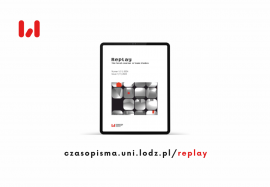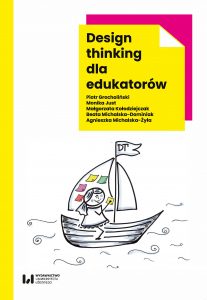Replay. The Polish Journal of Game Studies | VOL.11 NO. 1 (2024)
Opublikowano: 29 May 2024

Replay. The Polish Journal of Game Studies to pismo poświęcone interdyscyplinarnym studiom nad grami i odbiorcami gier, publikujące wyniki badań prowadzone z różnych perspektyw, między innymi kulturowej, socjologicznej i filozoficznej, ze szczególnym naciskiem na historię gier cyfrowych.
Zagadnienia podejmowane w periodyku dotyczą rozwoju i przeobrażeń medium gier wideo, zjawisk oraz praktyk towarzyszących uczestnictwu w rozgrywce, procesów zachodzących podczas interakcji pomiędzy grą i graczem, metodologii badań nad grami cyfrowymi, studiów przypadków ukazujących specyfikę rozwiązań mechanicznych i stylistycznych, a także znaczenia gier dla dzisiejszej kultury. Wśród poruszanych przez opublikowane artykuły problemów znajdują się między innymi: kwestia narracyjności gier, refleksja nad funkcjonowaniem wirtualnej przestrzeni, znaczenie interfejsu użytkownika, transmedialność gatunków, recepcja estetyki gier oraz ich artystycznego wymiaru.
Celem czasopisma jest stworzenie wspólnego, uniwersalnego języka dla badaczy gier cyfrowych, z którego mogliby korzystać wszyscy niezależnie od reprezentowanej dyscypliny. W związku z tym duży nacisk kładziony jest również na przyjmowanie prac dotyczących typologii gier cyfrowych i odpowiadającej im terminologii. Ponadto czasopismo dąży do rozwijania i popularyzowania wiedzy o grach, zarówno w kontekście teoretycznym (interdyscyplinarnym i specjalistycznym), jak i praktycznym (nowatorskie rozwiązania), a także bycia swoistym forum do wygłaszania opinii na temat gier oraz prezentowania i rozpowszechniania wyników badań empirycznych z tego zakresu, głównie osadzonych w kontekście gier cyfrowych.
W numerze (PDF):
“Drown Your Troubles in Coffee”: Place, Heterotopia, and Immersion in the Coffee Talk Series
Samuel Poirier-Poulin
This article contributes to the growing body of research on space, place, and immersion in video games and offers an analysis of placeness in Coffee Talk (Toge Productions, 2020) and Coffee Talk Episode 2: Hibiscus & Butterfly (Toge Productions, 2023). Building on the work of Michel Foucault (1967/2008), this article begins by analyzing the coffee shop of this series as a heterotopia that allows the game characters and the player to find a form of comfort. Then, it examines the series in light of theories of immersion and pays particular attention to the place where the author played the two games – his bed – and also describes it as a heterotopia. This paper shows the usefulness of Foucault’s concept of heterotopia to understand placeness and coziness in video games, and the relevance of taking into account the physical space of play when we conduct a textual analysis.
The Duality of Cozy Games: Cozy Agency, Neoliberalism, and Affect
Bettina Bódi
Cozy games can be thought of both as indoctrination into, and escapism from, anxieties caused by neoliberal ideology underpinning the late-capitalist apparatus championing productivity, progress, and quantifiable result generation. I draw on sociologist Anthony Giddens’ notion of “ontological security” – which refers to our sense of stability and safety that we draw from continuous, and therefore reliable, predictable, unthreatening, and familiar sequences of events or activities happening in our everyday lives – and propose the concept of “cozy agency” to productively examine the aesthetics of games that are not characterized by a hypermasculine drive to successfully overcome challenges, nor by the inessentiality of player action typical of idle games. Research on lifestyle media, cuteness, and vegetal affect is put into dialogue to theorize the modalities of agency typical cozy game aesthetics can afford and constrain. Such an approach is in line with recent shifts in discourses of agency and interactivity in game studies, which criticize these two terms for being too binary, masculine, and not accommodating alternative forms of engagement with games, with recent scholarship on agency especially calling for a politicization of the term and a call to delve into the significance of meaningful empowerment to act in/with/on/through games.
No Uglies: Rejection and Utopia in “Animal Crossing: New Horizons”
Alexander Calloway
What motivates cruelty against video game characters designed to be friendly? Using human-to-NPC interactions within the game Animal Crossing: New Horizons as a case study, this paper seeks to define what aspects of a cozy game contribute towards public displays of aggression or kindness toward the game’s characters. An examination of public forums dedicated to discussing villagers deemed ugly reveals the importance of parasocial connections in the utopian community planning aspects of Animal Crossing’s gameplay. The resulting online discourse surrounding ethical treatment of villagers becomes part of players’ conceptions of their role as social planner in-game, further solidifying which behaviors and objectives will yield them the coziest experience. Paratext, therefore, plays an active role in the conception and socialization of Animal Crossing players’ utopian urban projects.
Comfortably Numb: An Ideological Analysis of Coziness in Videogames
Andrea Andiloro
This essay analyses the concept of coziness in videogames, focusing on their role as a stress-relieving diversion in modern capitalist societies. The article emphasizes the genre’s features of safety, abundance, and softness, which create an atmosphere that soothes players amidst high-paced, contemporary lifestyles. While often framed as a type of resistant design, it is argued that cozy games uphold capitalist principles, by encouraging players to replicate them within the game. The discussion extends to the idea of coziness in interior design within these games, which is shown to reproduce ideologies of class, status, and consumerism. Drawing from atmosphere theory as well as the works of Jean Baudrillard, Slavoj Žižek, and Richard Dyer, the author argues that even the act of designing cozy spaces in these games serves as a continuation of capitalism and that cozy games may be thought of as utopian entertainment attempting to answer societal shortcomings through capitalist solutions. Thus, the essay posits that while cozy games offer a respite, they reproduce the conditions sustaining capitalist modernity.
Cozy Heterotopias in JRPGs: A Foucauldian Perspective on the Spatiality of Coziness in Japanese Role-Playing Games
Stefan H. Simond, Tobias Klös
This article applies the concept of heterotopia as developed by Michel Foucault to cozy aesthetics in JRPGs. After introducing the concept of heterotopia and its six key principles, the term JRPG is briefly reflected upon. We then analyze key aspects of the games Ni no Kuni: Wrath of the White Witch and Final Fantasy VII Remake regarding the significance of heterotopias for their sense of coziness. We conclude that Foucault’s concept of heterotopia helps in understanding the way in which coziness, on the one hand, offers a respite from the crises of life while, on the other hand, enabling an engagement with said crises in a safe environment.
Soft Horrors: The Visual and Ludic Safety of Dark Cozy Games
Agata Waszkiewicz
According to their most popular definition, cozy games are characterized by visual softness and relaxing gameplay devoid of combat and time-sensitive gameplay. However, with the recent increase in popularity of these games, game developers started to experiment with genre hybridity, introducing games that combine the elements of coziness with non-cozy elements such as difficult combat or horror themes, showing a need for critical engagement with the working definition of what is cozy. The article proposes a concept of dark cozy games to describe those titles that introduce visual softness and, to some degree, ludic safety to horror or Gothic, using three examples to illustrate different ways in which that can be achieved: Cult of the Lamb, Dredge, and Oxenfree.
Negotiating Anthropocentrism and Ecologies in Cozy Games
Morgan Pinder
As we sit at the precipice of this planet’s sixth mass extinction event, we need to use every tool at our disposal to advocate for our ecologies. Human self-interest and anthropocentric thinking act as barriers to communicating ecocrisis. Cozy video games can create safe spaces to explore the ecological effects of human actions with the aim of prompting reflection and action on environmental issues. Drawing on ecocritical video game scholarship, the aim of this article is to explore the ways in which environments are represented and interacted with in selected cozy video games. Through an examination of the extractivist colonial processes and narratives of Animal Crossing: New Horizons, in contrast with the complex ecocritical coziness of Terra Nil, this article posits that cozy games have the potential to achieve effective environmental communication. Both Animal Crossing: New Horizons and Terra Nil successfully empower the player to shape their environment but only Terra Nil affords ecological empowerment. By creating a safe space to engage with environments and even ecocrisis, cozy games allow players the agency to construct their own econarratives and may challenge or perpetuate anthropocentric ideas about the environment.
Cozy Games and Resistance Through Care
Agata Waszkiewicz, Marta Tymińska
Gry przytulne i opór poprzez troskę
Agata Waszkiewicz, Marta Tymińska
Komentarze
Ten post dostępny jest także w języku: Polish





